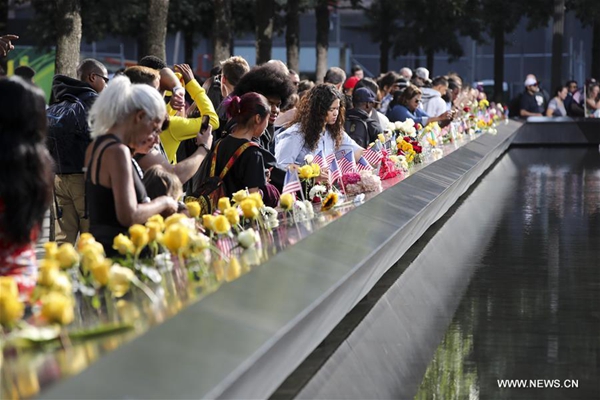The world 16 years after 9/11
- By George N. Tzogopoulos
 0 Comment(s)
0 Comment(s) Print
Print E-mail China.org.cn, September 13, 2017
E-mail China.org.cn, September 13, 2017
 |
|
People place flowers on plates on which the names of 9/11 victims were inscribed around the South Pool at the National September 11 Memorial and Museum in New York, the United States, on Sept. 11, 2017. People paid their tributes here on Monday to mourn the victims of the 9/11 terror attacks which happened 16 years ago and claimed thousands of lives. [Xinhua] |
It is tempting for scholars of international relations to anticipate future developments. Drawing on the study of history and their own research they attempt to elaborate on patterns on how world politics could evolve.
Francis Fukuyama’s book The End of History after the demise of the Soviet Union has been perhaps the most characteristic case during the new world order. Seeing that the U.S. remains the only superpower and the bipolar structure collapsed, the famous intellectual thought that Washington’s superiority might not be challenged any longer.
Fukuyama was only partly correct. It was not another power – like the Soviet Union – which confronted the U.S. after 1989 indeed. Another asymmetric rival emerged though.
A group of unpredictable terrorists was determined to support its cause by all means and struck the superpower at an unprecedented scale. The terror attack on September 11, 2001 (9/11) spread death and pain in the U.S. and shocked the planet. It also marked the beginning of a new era of terrorism in a globalized world and required an immediate response.
Even after 9/11, the military strength of the U.S. was incomparable. However, this military strength could not necessarily guarantee political victories. We saw this in Afghanistan and Iraq where Washington decided to wage its fights against terror.
More importantly, by deciding to initiate a military coalition without UN legitimization to overthrow the regime of Saddam Hussein, the U.S. confirmed its ability to follow the path of unilateralism in world affairs. Ironically, this decision paved the way for multilateralism.
The American image in the world was tarnished, a rising number of countries and scholars were vocal on the need of international cooperation and the continuous bloodshed in the Middle East led the successor of George W. Bush, Barack Obama, to reconsider the foreign policy priorities of his country.
On the whole, Obama refrained from taking unilateral decisions and improved the collaboration capacity between the U.S. and its partners. But, in essence, he failed to eradicate terrorism. Terrorists almost received a message by Obama that Washington would not militarily intervene against them. They thus found room and certainty to plan their actions without serious obstacles.
This is how the Islamic State – practically taking the place of al Qaeda – became the new threat. When finally Obama decided to respond against the terror organization in Syria and Iraq, a serious problem already existed. Fighters of the Islamic States were strong opponents in the Middle East and potential perpetrators of terror attacks in several world cities.
Eight years of the Obama administration passed and Donald Trump became the new American president. The 16th anniversary of 9/11 finds him ready to “annihilate” terrorism, but the world does not always look safe.
Although current security dilemmas are as significant as they were in the immediate aftermath of 9/11, the period of American unilateralism or unquestionable hegemony is almost over.
Other countries such as China and Russia play a critical role in world affairs. With emphasis on China, a country which has encountered the thorn of terrorism, its progress since 9/11 has been remarkable. Its peaceful development – and particularly its economic rise along with its contribution to international organizations – is widely acknowledged. China has naturally upgraded its position in the globalized world and is taking initiatives at the foreign policy level.
As already said, it is tempting to anticipate future developments. It is wiser to avoid predictions and focus on current trends. The establishment of a multipolar or an apolar world does not constitute a prophecy but a reality. And here China has a say which could not have been foreseen when al Qaeda hit the U.S. It is not surprising that Donald Trump has regularly held telephone conversations with his Chinese counterpart, Xi Jinping, to discuss important international challenges.
The 16th anniversary of 9/11 reminds us how terrorism can change politics and ordinary life. The tribute to the victims is essential as well as the continuous providing of support to injured people and their families.
Also, the lesson learned sixteen years later is that the complexity of world problems should not lead to unilateral policy choices. Xi reiterated his commitment to multilateralism speaking during the recent Xiamen BRICS summit. This observation becomes timely as traditional wars can be nowadays complemented with wars without blood – cyber-attacks – a method carefully studied by terrorists.
George N. Tzogopoulos is a columnist with China.org.cn. For more information please visit:
http://www.china.org.cn/opinion/GeorgeNTzogopoulos.htm
Opinion articles reflect the views of their authors, not necessarily those of China.org.cn.






Go to Forum >>0 Comment(s)